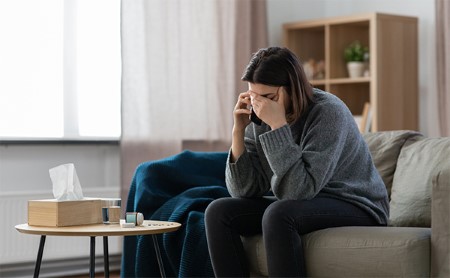Guam Behavioral Health and Wellness Center: A Pandemic Lifeline
July 25, 2022 | Alex Wheatley
 The COVID-19 pandemic has impacted physical and mental health around the globe. As cases rose, so did mental and behavioral health challenges related to isolation, anxiety, depression, and substance use. The COVID-19 pandemic presented an opportunity for an existing behavioral health resource—the Guam Behavioral Health and Wellness Center’s Crisis Hotline—to become a household name. During the pandemic, the hotline became a lifeline for a community in crisis greatly in need of information.
The COVID-19 pandemic has impacted physical and mental health around the globe. As cases rose, so did mental and behavioral health challenges related to isolation, anxiety, depression, and substance use. The COVID-19 pandemic presented an opportunity for an existing behavioral health resource—the Guam Behavioral Health and Wellness Center’s Crisis Hotline—to become a household name. During the pandemic, the hotline became a lifeline for a community in crisis greatly in need of information.
Suicide ranks among the top causes of death in Guam, and the suicide rate is markedly higher than in the continental United States. According to the Guam State Epidemiological Profile, the age-adjusted suicide death rate in 2018 was 31.3 per 100,000, more than double the rate (14.2) in the continental United States. Nearly 50% of Guam’s suicides occur among people under age 30. Almost one in four high school students reported seriously considering suicide in 2019; one in six attempted it.
Against this backdrop, with schools closed and communities isolated, the Guam Behavioral Health and Wellness Center (GBHWC) bolstered its mental health resources. A key component of GBHWC’s COVID-19 mental health support has been an expansion of the Crisis Hotline (CHL).
Guam’s CHL officially launched in 1991, when the territory’s strong ties to the U.S. military—three on-island bases and high induction rates— translated into an increased need for counseling during Operation Desert Storm. GBHWC fully integrated the hotline in 1995. GBHWC is a distinct department of the Government of Guam separate from the Department of Health and Human Services and provides mental health services for all Guamanians.
Since its inception, community members have used the CHL as a source of support in areas that range from relationship difficulties to suicidal ideation. As part of the larger mental health safety net, the CHL also has strong ties to the Guam Fire Department, Victims Advocate Reaching Out (a domestic violence nonprofit), Adult Protective Services, and Adult Outpatient Services.
Prior to the pandemic, the CHL averaged 25 to 30 calls per month. As COVID-19 reached Guam in spring 2020, calls increased more than 1,100% as people sought additional information about the virus and support related to depression, anxiety, and suicidal ideation.
As calls to the hotline rose, GBHWC moved to a 24-hour format. It expanded its staff from on-shift nurses and trained volunteers to a cohort of around-the-clock “counselors” who could listen to concerns, provide information and support, and, if need be, connect callers to a telehealth appointment at the GBHWC. The hotline was advertised in newspaper articles, on the radio, and in the Governor’s COVID-19 briefings.
On average, the CHL received 600-700 calls per month in 2020—more than 1,100 in June and July alone. In 2021, that average rose to more than 800 calls per month. Therese Arriola, Director of the GBHWC, attributed the high call volumes of 2021 to a variety of factors including additional stress from job loss, financial pressures, and fears of the delta variant infecting the vaccinated and those too young for the vaccine, as well as grief for those who had experienced a severe infection or died. As COVID-19 began to wane in 2022, so did calls to the CHL. By April 2022, calls had decreased to a steady 500 calls per month, with most of those calls related to feelings of isolation, anxiety, and depression.
Guam has fully integrated their local crisis hotline (671-647-8833) with the national suicide and crisis lifeline (988). As of July 16, people who call 988 from a Guam area code are serviced by local GBHWC Crisis Hotline employees.
During the Guam community’s darkest moments in this public health crisis, the Crisis Hotline cemented its position as a critical resource within the behavioral health landscape in Guam. As COVID-19 response efforts transition toward maintenance and integration with existing public health programming, this hotline and the Guam Behavioral Health and Wellness Center will continue to rise to meet the needs of those experiencing mental health crises in Guam.